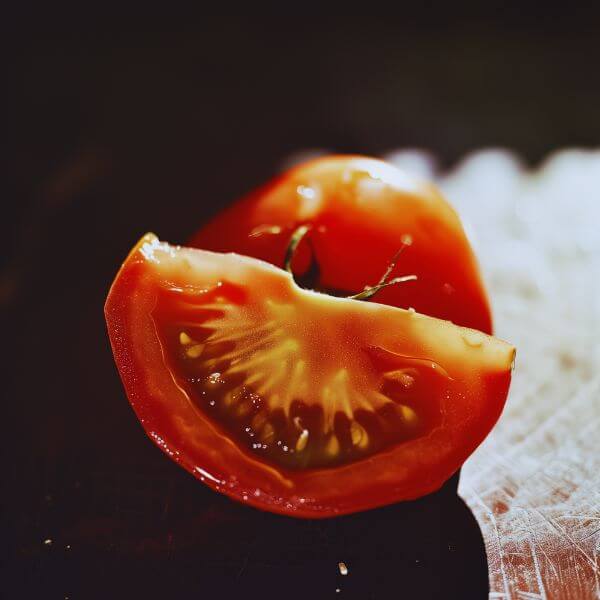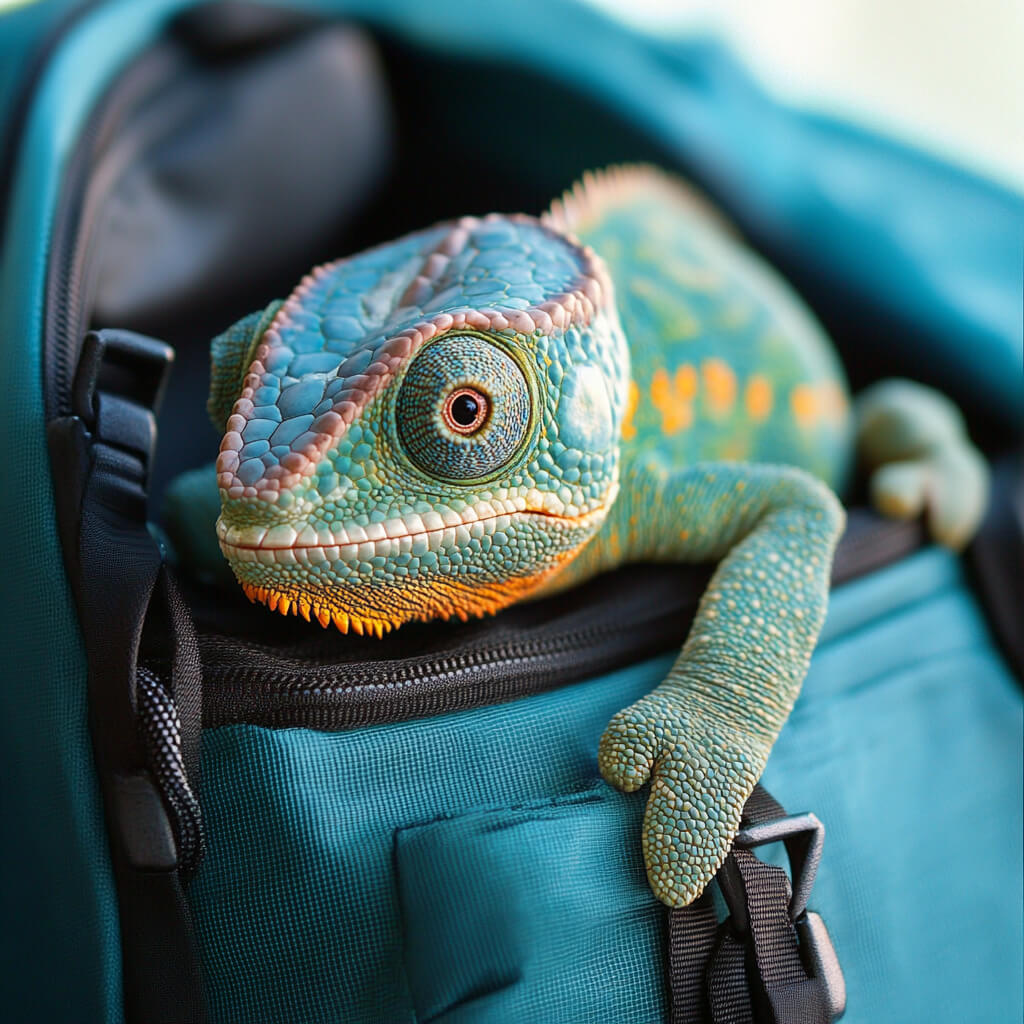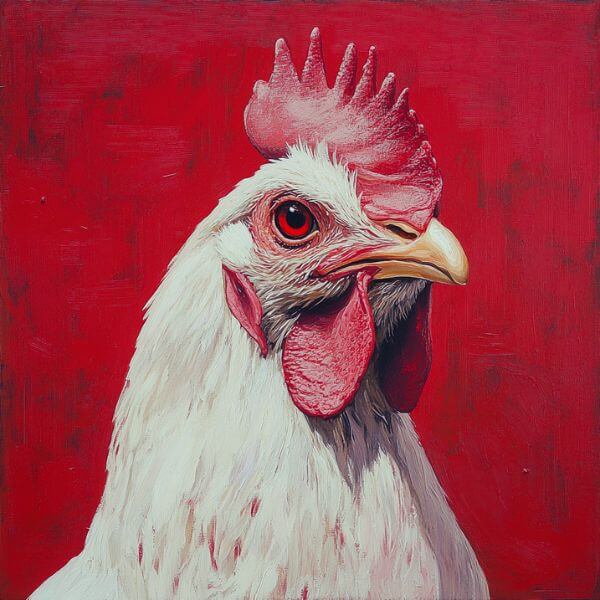Yes, chameleons can eat tomatoes but it’s not recommended.
While a tiny bite probably won’t hurt, tomatoes aren’t the best food choice for our scaly friends. Here’s why:
- Tomatoes are acidic
- They’re not a natural part of a chameleon’s diet
- There are better fruit options out there
Risks of Feeding Tomatoes to Chameleons
Now, let’s talk about why tomatoes might be a no-go for your chameleon pal.
Tomato Acidity
Tomatoes are pretty acidic. Think about how your tummy feels after eating too much spaghetti sauce! For chameleons, this acidity can be tough on their digestive system. It might lead to:
- Upset stomach
- Diarrhea
- Loss of appetite
Tomato Plant Dangers
Here’s a big no-no: never let your chameleon near tomato leaves or stems.
These parts of the plant contain stuff that’s toxic to many animals, including our chameleon buddies.
Safe Feeding Practices for Chameleons
Okay, so tomatoes are out. But how should we feed our chameleons? Let’s break it down:
Portion Sizes
Chameleons are small, so their meals should be too. A good rule of thumb:
| Age | Portion Size |
| Baby | 2-3 small insects per day |
| Adult | 5-6 medium insects every other day |
Remember, these are just guidelines. Every chameleon is unique!
Feeding Schedule
Chameleons don’t need to eat every day. Here’s a simple schedule:
| Day | Feed or Rest? |
| Monday | Feed |
| Tuesday | Rest |
| Wednesday | Feed |
| Thursday | Rest |
| Friday | Feed |
| Saturday | Rest |
| Sunday | Rest |
Preparing Food
If you do give your chameleon fruits or veggies (not tomatoes!), always:
- Wash thoroughly
- Cut into tiny, chameleon-sized bites
- Remove any seeds or pits
Nutritional Value of Tomatoes for Chameleons
Let’s pretend for a second that tomatoes were okay for chameleons. What’s in them?
| Nutrient | Amount per 100g |
| Vitamin C | 14mg |
| Potassium | 237mg |
| Vitamin K | 7.9μg |
Sounds good, right?
But here’s the thing: chameleons get most of these nutrients from insects and leafy greens.
They don’t need tomatoes to be healthy.
Alternatives to Tomatoes in Chameleon Diet
So, what can your chameleon eat? Let’s make a list!
Safe Fruits for Chameleons
- Apple (no seeds)
- Banana (in tiny amounts)
- Blueberries
- Mango
Veggies Chameleons Can Munch On
- Collard greens
- Mustard greens
- Dandelion leaves
- Bell peppers
But remember, fruits and veggies should only be occasional treats. The real stars of a chameleon’s diet are insects!
Insect Buffet
Here’s what should make up most of your chameleon’s meals:
- Crickets
- Dubia roaches
- Mealworms
- Waxworms (as a treat)
Chameleon Species and Dietary Differences
Not all chameleons are the same! Let’s look at some popular pet chameleons and their food preferences:
| Species | Favorite Foods |
| Veiled Chameleon | Crickets, locusts, leafy greens |
| Panther Chameleon | Variety of insects, occasional fruit |
| Jackson’s Chameleon | Smaller insects, less variety needed |
Maintaining a Balanced Diet for Chameleons
Keeping your chameleon healthy is like solving a puzzle. Here are the pieces:
- Variety: Mix up those insects!
- Gut-loading: Feed the insects healthy foods before feeding them to your chameleon.
- Dusting: Sprinkle insects with calcium powder a few times a week.
- Hydration: Mist your chameleon’s enclosure for drinking water.
FAQs
How often can chameleons eat fruits?
Fruits should be rare treats, maybe once or twice a month.
What vegetables are safe for chameleons?
Leafy greens like collard greens, mustard greens, and dandelion leaves are great choices.
Can baby chameleons eat tomatoes?
Nope! Baby chameleons should stick to small insects.
How do I know if my chameleon has eaten something harmful?
Watch for signs like loss of appetite, lethargy, or diarrhea. When in doubt, call a vet!
Are there any fruits chameleons should never eat?
Avoid citrus fruits, avocados, and any fruit with large seeds or pits.
Conclusion
Whew! We’ve been on quite a journey through the world of chameleon cuisine.
Let’s wrap it up:
- Tomatoes aren’t great for chameleons
- Stick to insects as the main course
- Fruits and veggies are okay as occasional treats
- Every chameleon is unique, so watch how yours reacts to new foods
Remember, when in doubt, chat with a reptile vet.
They’re the real experts on keeping your color-changing pal happy and healthy!
Now go forth and feed your chameleon friend like a pro! 🦎🥬🦗







Leave a Reply